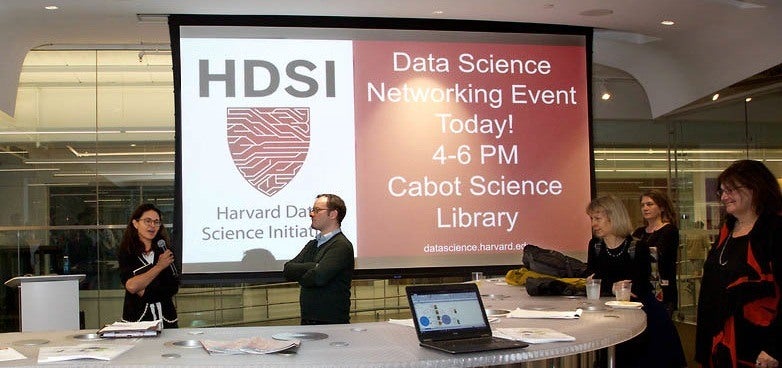On November 6, members from the Harvard Data Science Initiative (HDSI), Elsevier, and LexisNexis sat down to participate in three 90-minute multidisciplinary roundtables to identify problems of societal importance that can be addressed through data curation and analytics. Elsevier is making a substantial donation to HDSI over the next five years, and providing datasets along with technological expertise across a range of topics, including bibliometrics, data visualization, machine learning and natural language processing (NLP). The recent event, which included presentations from biostatistics faculty including Cory Zigler, Sebastien Haneuse, Miguel Hernan, and Tianxi Cai, and which was moderated by Francesca Dominici, Professor of Biostatistics and Co-Director of HDSI, provided an opportunity for the organizations to come together to share research interests, compare available data, and suggest projects for collaboration.
The roundtable discussions covered a variety of topics on which the organizations sought areas of mutual interest. The goal of Roundtable 1 was to find ways to support evidence-based policymaking in the face of growing pressure to justify investments in scientific research and link them to measurable outcomes. Participants agreed that science had to be more persuasive, and suggested projects and tools, including innovative and “disruptive” approaches to help impact policymaking. Roundtable 2 focused on the data needs for building interpretable models for precision medicine. Of particular interest are methods to extract data from electronic health records (EHRs), which are not standardized and vary widely among health facilities and countries. Participants expressed the need for a large normalized health data set as a resource for doing research and potential for follow-up in natural language processing of clinical notes and medical literature, using Elsevier’s resources and expertise. Participants of Roundtable 3 took on the issue of how to incorporate socioeconomic data to predict patients’ health outcomes and engage them in their own care. Much of the discussion was driven by the need for alternative sources of data, from individual claims data to health outcomes, to better harness the social and behavioral determinants of healthcare.
In summary, the meeting initiated a productive partnership, in which Harvard faculty will continue to work with Elsevier’s abundant data resources and expertise to identify the best questions to answer for the support of public health and ‘science-based’ policy-making, and for the advancement of research in a way that according to Cory Polonetsky, Senior Commercial Director for Patient Engagement at Elsevier, “no one party could do on its own.”
For more on the meeting, see Elsevier’s article here.




